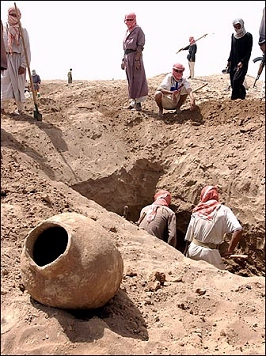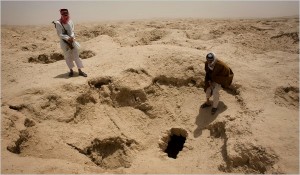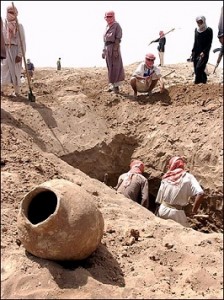Near and Middle East
Ancient artifacts have been subject to looting over many years. According to Ursula Lindsey with The New York Times, “The Middle East lost many of its ancient treasures in colonial times, when priceless artifacts were carried off to European collections and museums. It is now witnessing ‘a new wave of loss’ associated with wars and conflicts, said Tamar Teneishvili, a program specialist for culture at the Unesco regional bureau in Cairo. Many archaeologists are experiencing flashbacks to the American-led invasion of Iraq in 2003, when Baghdad’s national museum was looted and sites across the country were ransacked,” (Lindsey, 2014)
Looting has especially taken a toll on Dhahir, Iraq. According to an article written in The New York Times, “The looting of Iraq’s ancient ruins is thriving again. This time it is not a result of the “stuff happens” chaos that followed the American invasion in 2003, but rather the bureaucratic indifference of Iraq’s newly sovereign government,” (Myers, 2010).
The issue at hand is stopping the increase in black market trade with ancient artifacts. According to a staff writer with the Al Arabiya News, “The Islamic State of Iraq and Syria (ISIS), which has taken over large swathes of land in Iraq and Syria, is selling ancient Iraqi artifacts in the black market to finance its military operations in the region, Iraqi and Western officials said. Speaking at a conference at the U.N. cultural agency UNESCO in Paris, France’s ambassador to UNESCO Philippe Lalliot warned that Iraq’s cultural heritage is in “great danger,” (Al Arabiya News, 2014).
One of the measures taken to restore peace in the Middle East was the development of the antiquities police force in 2008 to replace withdrawing American troops.
Steven Myers with The New York Times states, “A new antiquities police force, created in 2008 to replace withdrawing American troops, was supposed to have more than 5,000 officers by now. It has 106, enough to protect their headquarters in an Ottoman-era mansion on the eastern bank of the Tigris River in Baghdad and not much else. ‘I am sitting behind my desk and I am protecting the sites,’ the force’s commander, Brig. Gen. Najim Abdullah al-Khazali, said with exasperation. ‘With what? Words?,’” said Myers.
“The failure to staff and use the force — and the consequent looting — reflects a broader weakness in Iraq’s institutions of state and law as the American military steadily withdraws, leaving behind an uncertain legacy,” (Myers, 2010).
In regards to the tourism industry, the significant loss of ancient artifacts has caused major setbacks in Iraq for financial gain. I believe one of the problems lie within the Iraqi forces. The force commander’s statement, “I am sitting at my desk and I am protecting the sites,” draws a major red flag when it comes to the quality of leadership within the organization. However, this may prove to be difficult considering the creation of the antiquities forces in 2008 proved to be a giant failure. The Iraqi government may need assistance with training to create teams that effectively enforce looting.
I believe the best way to create success in decreasing the rapid growth with ancient artifacts being sold on the black market is by getting the community involved. A joint campaign created between the US and Iraqi forces to promote the historical/cultural significance of the ancient artifacts may help decrease the social acceptance of the black market trade. Once, a legitimate Iraqi force has been built, I believe all matters regarding looting should be taken care of internally.
Another problem lies within the ethics of museums, galleries and universities. These institutions should be held more accountable in regards to the knowledge of where they acquired their artifacts. Extensive documentation and background checks should be mandatory when making acquisitions. It is too easy for the manager of an art gallery to say, “I did not know the painting we received was originally stolen.”
Ultimately, the Iraqi antiquities forces need a complete overhaul to enforce the growing looting issues in the Middle East. Also, museums, universities and other institutions need to be held accountable when making acquisitions with privates sellers. If these two issues are effectively dealt with there may be a chance to stop the increase in looting.
Sources
Academics and Archaeologists Fight to Save Syria’s Artifacts
By URSULA LINDSEY AUG. 24, 2014
Iraq’s Ancient Ruins Face New Looting
By STEVEN LEE MYERS Published: June 25, 2010
ISIS selling Iraq’s artifacts in black market: UNESCO By Staff Writer, Al Arabiya News Published: Tuesday, 30 September 201
http://english.alarabiya.net/en/News/middle-east/2014/09/30/ISIS-selling-Iraq-s-artifacts-in-black-market.html
Looting at Weapons Plants Was Systematic, Iraqi Says By James Glanz and William J. Broad Published March 13, 2005 http://www.nytimes.com/2005/03/13/international/middleeast/13loot.html
Syria’s Neighbors Must Pressure Assad on Preserving Antiquities By James McAndrew Published: October 9, 2014 http://www.nytimes.com/roomfordebate/2014/10/08/protecting-syrias-heritage/syrias-neighbors-must-pressure-assad-on-preserving-antiquities
Course Power Points:
Neo-Babylon & Assyria
Blackboard



